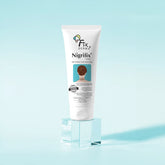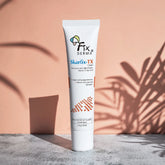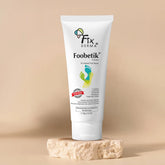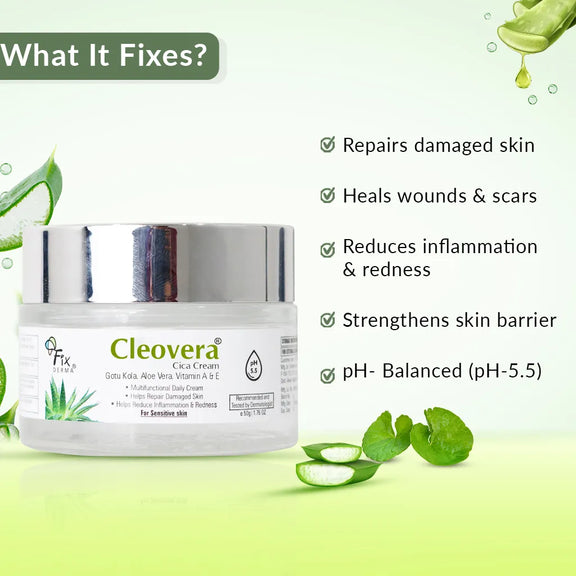Rosacea on Face: Symptoms, Causes, Treatments
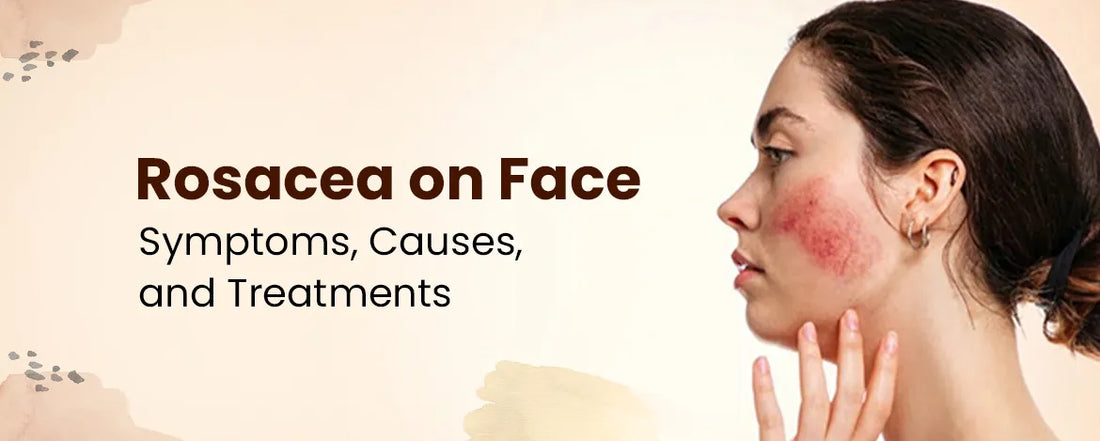
Rosacea is a common skin condition that primarily affects the face, causing redness and visible blood vessels. It often develops gradually and tends to worsen over time if left untreated. While the exact cause of rosacea is not fully understood, it's believed to involve a combination of genetic and environmental factors.
Here are the common symptoms of rosacea:
- Facial Redness: Persistent redness, often resembling a blush or sunburn, is a hallmark symptom of rosacea. This redness typically appears on the central part of the face, including the cheeks, nose, forehead, and chin.
- Visible Blood Vessels: Small, visible blood vessels (telangiectasia) may appear on the skin's surface due to the inflammation associated with rosacea. These blood vessels can contribute to the red appearance of the skin.
- Papules and Pustules: Similar to acne, rosacea can lead to the development of small, red bumps (papules) and pus-filled bumps (pustules) on the face. However, unlike acne, these bumps are not usually accompanied by blackheads.
- Eye Irritation: Ocular rosacea is a subtype of rosacea that affects the eyes. Symptoms can include dryness, burning, itching, redness, and sensitivity to light. In some cases, the eyes can appear bloodshot.
- Enlarged Nose: In more severe cases, a condition known as rhinophyma can develop, causing the nose to become swollen, red, and bumpy. This is more common in men.
- Burning or Stinging Sensation: Many individuals with rosacea experience a sensation of burning or stinging on their face. This can be triggered or worsened by certain skincare products or environmental factors.
Skincare mistakes that can lead to rosacea:
Certain skincare practices can inadvertently aggravate rosacea symptoms or trigger flare-ups. Here are some skincare mistakes to avoid if you have rosacea:
- Using Harsh Cleansers and Exfoliants: Rough scrubbing and using harsh cleansers or exfoliants can irritate sensitive skin, leading to redness, inflammation, and worsening of rosacea symptoms. Opt for gentle, non-abrasive cleansers and avoid excessive exfoliation.
- Not Patch Testing Products: Introducing new skincare products without patch testing can be risky. Some ingredients can trigger rosacea flare-ups. Test new products on a small area of skin before applying them to your entire face.
- Skipping Sunscreen: Sun protection is crucial for managing rosacea. UV rays can worsen redness and inflammation. Use broad-spectrum sunscreen with SPF 30 or higher daily, even on cloudy days.
- Overusing Products: Applying too many products or using them too frequently can overwhelm the skin and cause irritation. Keep your skincare routine simple and avoid overloading your skin with products.
- Ignoring Triggers: Not identifying and avoiding personal triggers can lead to frequent flare-ups. Keep a diary to track what worsens your symptoms and adjust your routine accordingly.
- Using Astringents and Toners: Some astringents and toners contain alcohol or other harsh ingredients that can strip the skin's natural moisture barrier. This can lead to dryness and irritation in rosacea-prone skin.
- Using Rough Towels: Pat your face dry gently with a soft, clean towel after cleansing. Rubbing your face vigorously with a rough towel can cause friction and irritation.
- Not Following a Consistent Routine: Consistency is key when managing rosacea. Skipping your skincare routine or changing products too frequently can disrupt your skin's balance and trigger flare-ups.
- Not Moisturizing: Even if you have oily skin, moisturizing is essential to maintain the skin's barrier function. Use a lightweight, non-comedogenic moisturizer to keep your skin hydrated.
- Using Products Not Meant for Rosacea: Using products designed for other skin types or conditions can worsen rosacea. Look for products formulated for sensitive or rosacea-prone skin.
By avoiding these skincare mistakes and adopting a gentle and consistent routine, you can help manage and minimize rosacea symptoms.
What are the main triggers that can exacerbate rosacea symptoms?
Rosacea symptoms can be triggered or aggravated by a variety of factors, and identifying and avoiding these triggers is an important part of managing the condition. Here are some common triggers that can exacerbate rosacea symptoms:
- Sun Exposure: Sunlight and ultraviolet (UV) rays are known to worsen rosacea symptoms. Protecting the skin from the sun by using broad-spectrum sunscreen and wearing hats and sunglasses can help minimize flare-ups.
- Hot and Cold Weather: Extreme temperatures, both hot and cold, can lead to flare-ups. Heat dilates blood vessels and cold weather can cause constriction, both of which can trigger redness and sensitivity.
- Wind: Wind can further irritate sensitive skin and lead to increased redness and discomfort for individuals with rosacea.
- Spicy Foods: Spicy foods can cause blood vessels to dilate, leading to increased redness and flushing. Avoiding excessively spicy foods can help manage symptoms.
- Hot Beverages: Hot drinks like coffee and tea can induce flushing and contribute to rosacea symptoms. Opting for cooler beverages may be beneficial.
- Alcohol: Alcoholic beverages, particularly red wine, and hard liquor are known triggers for many people with rosacea. Alcohol can cause blood vessels to dilate and worsen redness.
- Certain Foods: While triggers can vary among individuals, some common trigger foods include chocolate, citrus fruits, tomatoes, and foods high in histamines.
- Stress: Emotional stress and anxiety can lead to increased blood flow to the skin, resulting in flushing and exacerbation of rosacea symptoms.
- Intense Exercise: Vigorous physical activity can cause flushing and increased blood flow to the skin. It's advisable for individuals with rosacea to engage in moderate exercise and avoid overheating.
- Certain Skincare Products: Harsh cleansers, abrasive scrubs, and products containing alcohol or fragrances can irritate sensitive skin and trigger flare-ups.
- Hot Baths and Saunas: Heat from hot baths, saunas, and steam rooms can dilate blood vessels and worsen rosacea symptoms.
- Medications: Some medications, particularly those that cause blood vessels to dilate or increase blood flow, can trigger or exacerbate rosacea symptoms.
- Caffeine: Caffeine, found in coffee, tea, and certain energy drinks, can contribute to increased flushing and redness in some individuals.
What is the best ingredient to soothe rosacea-prone skin?
For individuals with rosacea-prone skin, finding soothing ingredients that can help alleviate redness, inflammation, and sensitivity is essential. One such ingredient that has gained significant attention in recent years for its calming properties is Centella Asiatica, often referred to as "Cica."
Cica is a botanical extract derived from a plant native to Asia, and it has a rich history in traditional medicine for its wound healing and anti-inflammatory properties. What makes Cica particularly beneficial for rosacea-prone skin is its ability to modulate the skin's inflammatory response. It contains compounds like Asiaticoside, Asiatic Acid, and Madecassic acid, which work together to soothe and repair the skin's barrier. These compounds are known to support collagen production, aiding in skin repair, and reducing redness. Cica is also an antioxidant, which means it helps neutralize harmful free radicals that can contribute to skin inflammation. By incorporating skincare products containing Cica, such as creams, serums, and masks, individuals with rosacea can experience a notable reduction in redness and irritation. Cica-infused products provide a gentle approach to calming the skin, making them particularly suitable for those with sensitive skin types prone to rosacea flare-ups.
Try Cleovera Cica Cream, a calming relief for rosacea-prone skin. This cream stands as a promising solution for individuals dealing with rosacea-prone skin, offering a blend of carefully selected ingredients designed to provide soothing and healing benefits. This cream is formulated with a thoughtful combination of Cica, Gotu Kola, Vitamin A, Vitamin E, and Aloe Vera, all of which work synergistically to address the specific needs of sensitive and inflamed skin associated with rosacea.
- Cica (Centella Asiatica): Cica, derived from Centella Asiatica, is the star ingredient of this cream. Its anti-inflammatory properties make it an excellent choice for rosacea-prone skin. The active compounds in Cica, such as asiaticoside, asiatic acid, and madecassic acid, have been shown to help reduce redness, calm irritation, and support the skin's natural healing process. Cica also aids in fortifying the skin's barrier function, promoting improved resilience against environmental triggers that can worsen rosacea symptoms.
- Gotu Kola (Centella Asiatica): Gotu Kola, a botanical closely related to cica, is rich in triterpenoids that contribute to its anti-inflammatory and antioxidant properties. When combined with cica, Gotu Kola enhances the overall soothing effect of the cream, helping to alleviate discomfort and redness associated with rosacea-prone skin.
- Vitamin A: Vitamin A, often referred to as retinol, plays a significant role in promoting healthy skin cell turnover and stimulating collagen production. In Cleovera Cica Cream, Vitamin A helps support skin renewal, aiding in the repair of damaged skin and contributing to a smoother complexion. It's important to note that while Vitamin A can be beneficial, those with rosacea-prone skin should introduce it gradually to avoid potential irritation.
- Vitamin E: Vitamin E is a potent antioxidant that helps protect the skin from oxidative stress and free radicals, which can trigger inflammation and exacerbate rosacea symptoms. By reducing oxidative damage, Vitamin E assists in maintaining a more balanced and calmer skin environment.
- Aloe Vera: Aloe Vera has long been recognized for its soothing and hydrating properties. It can provide instant relief to irritated and sensitive skin, helping to alleviate redness and discomfort. Aloe Vera's gentle nature makes it suitable for rosacea-prone skin, providing an added layer of comfort.
Incorporating Cleovera Cica Cream into a skincare routine offers a multi-faceted approach to managing rosacea symptoms. The blend of Cica, Gotu Kola, Vitamins A and E, and Aloe Vera ensures that the cream addresses inflammation, promotes healing, supports the skin barrier, and provides much-needed hydration. However, it's advisable to consult with a dermatologist too. With a thoughtful formulation, Cleovera Cica Cream is the best option for those seeking effective relief to people facing rosacea.
How can sunscreen play a crucial role in managing rosacea and preventing flare-ups?
Sunscreen plays a crucial role in managing rosacea and preventing flare-ups by providing essential protection against the harmful effects of ultraviolet (UV) radiation. Individuals with rosacea often have sensitive skin that is prone to inflammation and increased reactivity. Exposure to UV rays can exacerbate these symptoms, leading to heightened redness, flushing, and irritation. Sunscreen acts as a shield, forming a barrier between the skin and UV radiation, thereby minimizing the risk of triggering or worsening rosacea symptoms. By using broad-spectrum sunscreen with a minimum SPF of 30 daily, even on overcast days, individuals with rosacea can safeguard their skin from the sun's harmful rays. This preventive measure helps maintain the skin's barrier function, reduces the likelihood of blood vessel dilation, and aids in controlling the overall inflammation associated with rosacea. Incorporating sunscreen into a consistent skincare routine empowers those with rosacea to proactively manage their condition, enhance their skin's resilience, and enjoy the benefits of improved skin health and appearance.
Read more - The Science Behind Steroids: How They Affect Skin Cells and Tissues
